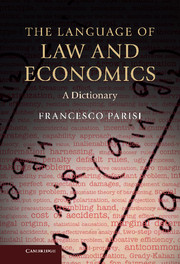G
Published online by Cambridge University Press: 04 August 2017
Summary
Game theory: a field of microeconomics for the study of strategic or interdependent decision-making. A strategic situation arises whenever an agent, seeking to maximize the returns to his or her actions, is placed in a context in which his or her returns may be influenced by the actions of others. The “game” is thus created by the interaction of players, their possible strategies, and the payoffs for each strategy. Virtually every legal problem involves a strategic component (e.g., the precautions of a prospective tortfeasor depend on the expected behavior of his or her victim, and vice versa; the reliance of a promisee in a contract depends on the expected behavior of the promisor; and so on). The analytical tools of game theory become particularly valuable in understanding how human beings make such interdependent decisions. Game theory is used to predict how rational players will behave in strategic situations, or at least to explain how idealized rational players should behave under such circumstances. The representation of strategic situations under the form of games is educational. In games, players devise strategies on the basis of expected counter moves from the other player(s). Many real-life economic situations are characterized by similar strategic interactions, and game theory thus provides a very useful set of tools for strategic decision-making. The foundations of game theory were laid by the monumental work by John von Neumann and Oskar Morgenstern entitled Theory of Games and Economic Behavior (1944). See also Nash equilibrium, prisoner’s dilemma, battle of the sexes, chicken game, and assurance game.
- Type
- Chapter
- Information
- The Language of Law and EconomicsA Dictionary, pp. 128 - 132Publisher: Cambridge University PressPrint publication year: 2013



